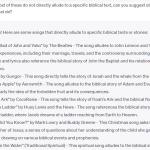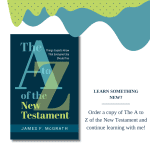In my class on the Bible and Music, one of the topics is bringing texts together from different parts of the Bible into a new work, in which those fragments have a new context and thus take on a new meaning. We look at examples such as Handel’s Messiah, Brahms’ Requiem, Dave Brubeck’s The Gates of Justice, and Herbert Howells’ Hymnus Paradisi. It provides an opportunity to think about what is involved in this process, and how it relates not just to musical composition but the use of the Bible in crafting theologies and other systems of meaning, where biblical words and phrases are reconfigured into something that no individual text says.
I like to assign myself anything that I assign to students in this class, and so here is my creation, “A Professor and His Students.” It is worth mentioning, given how it begins and ends, that the class meets at 8 am and so is students’ first class of the day.
A Professor and His Students
And all the people would get up early in the morning to listen to him (Luke 21:38).
He came to the students and found them sleeping (Matthew 26:40), then he said to his students (Matthew 9:37),
“Take my instruction (Proverbs 8:10). I have acquired great wisdom…and my mind has had great experience of wisdom and knowledge (Ecclesiastes 1:16).
For truly my words are not false; one who is perfect in knowledge is with you (Job 36:4).
Hear instruction and be wise, and do not neglect it (Proverbs 8:33).
Those who ignore instruction despise themselves, but those who heed admonition gain understanding (Proverbs 15:32).
Though I write for him the multitude of my instructions, they are regarded as a strange thing (Hosea 8:12).
In that way I will test them, whether they will follow my instruction or not. (Exodus 16:4)
I wrote for this reason: to test you and to know whether you are obedient in everything (2 Corinthians 2:9).
All must test their own work; then that work, rather than their neighbor’s work, will become a cause for pride (Galatians 6:4).
No testing has overtaken you that is not common to everyone (1 Corinthians 10:13).”
When the students heard this, they fell to the ground and were overcome by fear (Matthew 17:6).
When many of his students heard it, they said, “This teaching is difficult; who can accept it?” (John 6:60).
The students looked at one another, uncertain of whom he was speaking (John 13:22).
And the students were perplexed at these words (Mark 10:24).
His disciples remembered that it was written (John 2:17),
“And let them first be tested (1 Timothy 3:10)…prepare yourself for testing (Sirach 2:1).
I was sent to you to test you (Tobit 12:14).
They will test you by prolonged talk, and while they smile they will be examining you (Sirach 13:11).
For the lowliest may be pardoned in mercy, but the mighty will be mightily tested (Wisdom of Solomon 6:6).
…This is the way people are tested (Sirach 27:7).
Would it turn out well if he examined you? (Job 13:9)
Whatever was written in former days was written for our instruction (Romans 15:4).”
His students said, “Yes, now you are speaking plainly, not in any figure of speech! (John 16:29).
I did not listen to the voice of my teachers or incline my ear to my instructors (Proverbs 5:13).
More strength must be exerted, but wisdom helps one to succeed (Ecclesiastes 10:10).
Test me and know my thoughts (Psalm 139:23).
This is my defense to those who would examine me (1 Corinthians 9:3).
When he has tested me, I shall come out like gold (Job 23:10).”
And the students were filled with joy (Acts 13:52).
In the morning, while it was still very dark (Mark 1:35),
They sing to the tambourine and the lyre, and rejoice to the sound of the pipe (Job 21:12).













